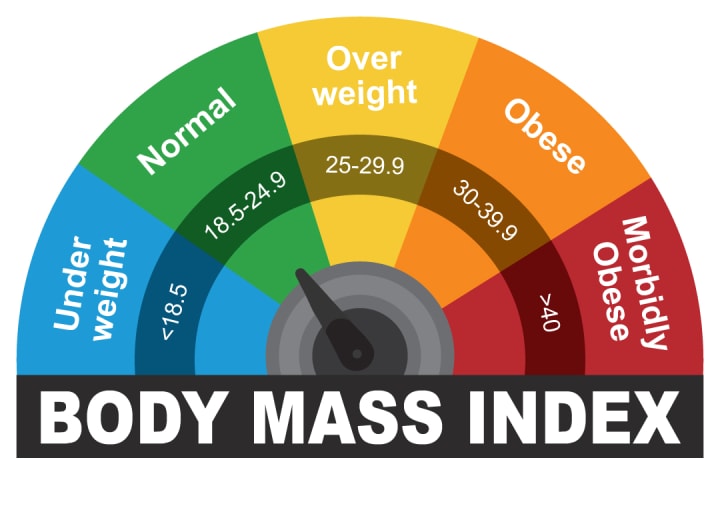Mastering the Art of Balanced Living: Achieving a Healthy BMI and Optimal Wellness
The Top Factors that Contribute to a Healthy BMI and Balanced Living

Body Mass Index, or BMI, is a measure of your body's fat based on your height and weight. It's a widely used tool to determine if you're at a healthy weight or if you're at risk for certain health conditions. But what is BMI exactly, and how accurate is it? Let's dive into the world of BMI and explore its pros and cons.
BMI is calculated by dividing your weight in kilograms by your height in meters squared. The resulting number falls into one of four categories: underweight, normal weight, overweight, or obese. However, BMI doesn't take into account factors like muscle mass, bone structure, or body composition. This means that someone with a lot of muscle mass may have a higher BMI even though they're not actually overweight or at risk for health problems.

Despite this limitation, BMI is still a useful tool for many people. It can help you get a general sense of whether you're at a healthy weight or if you need to make some changes to your diet and exercise routine. It's also a good starting point for discussing your overall health with your doctor.
If your BMI falls into the underweight category, it may indicate that you're not getting enough nutrition or that you have an underlying health condition. On the other hand, if your BMI falls into the overweight or obese categories, you may be at risk for conditions like heart disease, diabetes, and high blood pressure.
One of the biggest criticisms of BMI is that it doesn't take into account the differences between body types. For example, someone who is naturally more muscular may have a higher BMI even though they're not actually overweight. Similarly, someone who has a small frame may have a lower BMI even if they have excess body fat. This means that BMI shouldn't be used as the only measure of health, but rather as one piece of the puzzle.
Another limitation of BMI is that it doesn't take into account where your body fat is located. Research has shown that people who carry excess fat around their midsection (the so-called "apple" shape) are at higher risk for health problems than those who carry excess fat around their hips and thighs (the "pear" shape). This means that even if your BMI falls within the normal range, you may still be at risk for health problems if you carry excess fat in your midsection.
Despite its limitations, BMI is still a valuable tool for many people. If you're concerned about your weight or your overall health, talk to your doctor about your BMI and what it means for you. They can help you come up with a plan to improve your health and reduce your risk for conditions like heart disease, diabetes, and high blood pressure.

One of the most important factors to consider is diet. A healthy diet should be rich in fruits, vegetables, whole grains, lean proteins, and healthy fats. Processed and high-calorie foods should be limited, as they can contribute to weight gain and other health problems.
Exercise is also crucial for maintaining a healthy BMI. Regular physical activity can help burn calories and increase muscle mass, which can in turn help increase metabolism and burn even more calories. Aim for at least 30 minutes of moderate-intensity exercise most days of the week, such as brisk walking, cycling, or swimming.
Sleep is another important factor to consider when it comes to maintaining a healthy BMI. Lack of sleep or poor quality sleep has been linked to weight gain and obesity. Aim for at least 7-8 hours of sleep per night, and try to establish a regular sleep schedule.
Stress management is also important for overall wellness and maintaining a healthy BMI. Chronic stress can lead to overeating, lack of physical activity, and poor sleep habits. Find healthy ways to manage stress, such as meditation, yoga, or talking to a therapist.
The Top Factors that Contribute to a Healthy BMI and Balanced Living
Regular physical activity: Engaging in physical activity for at least 30 minutes a day can help you maintain a healthy weight and reduce the risk of chronic diseases.
Balanced diet: Consuming a diet that is rich in fruits, vegetables, whole grains, lean proteins, and healthy fats can help you maintain a healthy weight and provide your body with the nutrients it needs to function properly.
Adequate sleep: Getting enough sleep is essential for maintaining a healthy weight, as sleep deprivation can increase hunger and reduce metabolism.
Stress management: Chronic stress can lead to weight gain and other health issues, so finding ways to manage stress, such as meditation, yoga, or deep breathing, is important for maintaining a healthy BMI.
Avoiding smoking and excess alcohol consumption: Smoking and excessive alcohol consumption can lead to weight gain and a host of other health issues, so it's important to avoid these habits.
Calculate Your Body Mass Index Right Here: https://www.nhlbi.nih.gov/health/educational/lose_wt/BMI/bmicalc.htm
In conclusion, while BMI may not be a perfect measure of health, it's still a useful tool for many people. It can help you get a general sense of whether you're at a healthy weight or if you need to make some changes to your lifestyle. It's important to keep in mind that BMI is just one piece of the puzzle when it comes to your overall health. By working with your doctor and making healthy choices, you can reduce your risk for a wide range of health problems and enjoy a happier, healthier life.





Comments
There are no comments for this story
Be the first to respond and start the conversation.